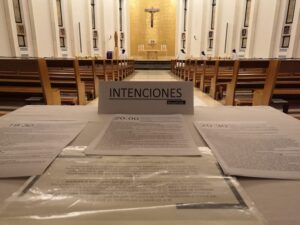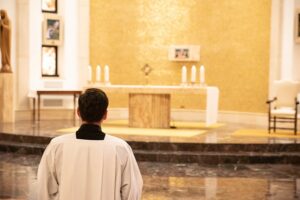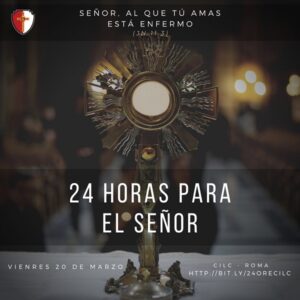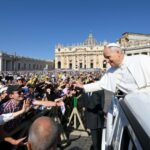 My first obligation as a Christian, before writing anything more or less thoughtful, is to remember all those who have died because of this pandemic and to ask God to shine for them the eternal light of His goodness and mercy. And also for all those suffering because of the contagion.
My first obligation as a Christian, before writing anything more or less thoughtful, is to remember all those who have died because of this pandemic and to ask God to shine for them the eternal light of His goodness and mercy. And also for all those suffering because of the contagion.
The dramatic global situation caused by the Coronavirus has disrupted the agenda of all humanity. This pandemic is making us think more about death than about life. It has forced us to think about God more than about ourselves. It has silenced our ideas of progress at all levels of human existence, launching us into the mystery of providence.
And in the face of so much tragedy and disarray, how can we speak of God’s goodness? Is there a message behind this? There are three tempting attitudes in front of this situation: exacerbated rationalism, naive fideism, or indifferent skepticism.
 Ironically asserting that God’s goodness punishes humanity, the exacerbated rationalism of some asks: Why does God punish man? Is this pandemic a divine punishment? Have we made a mistake, or has God let something slip? The naive fideist considers interesting questions: Will God bring out the best from so much evil? Could this be a consequence of our forgetfulness of God? Will this test bring something good? The indifferent skeptic is faithfully observing his quarantine and, in front of so many dead and infected, from his sofa eating cookies with hot chocolate, exclaims: “dead to the grave, alive to the cake.”
Ironically asserting that God’s goodness punishes humanity, the exacerbated rationalism of some asks: Why does God punish man? Is this pandemic a divine punishment? Have we made a mistake, or has God let something slip? The naive fideist considers interesting questions: Will God bring out the best from so much evil? Could this be a consequence of our forgetfulness of God? Will this test bring something good? The indifferent skeptic is faithfully observing his quarantine and, in front of so many dead and infected, from his sofa eating cookies with hot chocolate, exclaims: “dead to the grave, alive to the cake.”
The rationalist will end up frustrated demanding answers where there are none. For they have not even discovered the vaccine yet or how exactly this new virus reproduces. Frustrated rationalist! The fideist will end up losing touch with reality. Denying it, he will make it so that sooner or later this situation demands not only faith but also intelligent responses to a real crisis.
 The indifferent skeptic becomes unbearable, as he only looks at his own navel. He does not believe in God and does not pity man. He becomes an unbearable Narcissus!
The indifferent skeptic becomes unbearable, as he only looks at his own navel. He does not believe in God and does not pity man. He becomes an unbearable Narcissus!
Embracing one of these attitudes is common and comfortable. Either you question reality, or you believe everything will be resolved with divine help and cross your arms, or you suspend judgment and ignore everything. The writer is a Catholic Christian and, therefore, affirms that none of these three attitudes are sensible, human, and therefore Christian. So, what stance should we take?
At the International College of the Legionaries of Christ in Rome, the fathers and brothers are well, they are trying to follow the norms and precautions to avoid contagion. But certainly each one is facing this situation in their own way. As consecrated souls, we cannot adopt any of these attitudes mentioned earlier, but apply what Saint Augustine attributed to himself: “pray as if everything depended on God and work as if everything depended on you”. Therefore, in the face of this situation, a faith stance based on realism is needed, where one is aware of limits and dangers, avoiding falling into indifference.
 With this spirit, daily adoration of the Blessed Sacrament has been carried out, interceding for the sick and doctors who wear out their lives for the good of others, and from Friday the 20th to Saturday the 21st, there was a 24-hour adoration with this purpose. Likewise, the brothers of the General Directorate have gone up to the roof of the house to give words of encouragement to neighbors, offer a concert, and be a living presence of God in these difficult times.
With this spirit, daily adoration of the Blessed Sacrament has been carried out, interceding for the sick and doctors who wear out their lives for the good of others, and from Friday the 20th to Saturday the 21st, there was a 24-hour adoration with this purpose. Likewise, the brothers of the General Directorate have gone up to the roof of the house to give words of encouragement to neighbors, offer a concert, and be a living presence of God in these difficult times.
Certainly, God is not the one who produced the virus, but unfortunately, nature escapes from our hands due to recklessness and human limits. From faith, every Christian faces this situation with realism and patience because he knows that what the soul is in the body, so is the world. The Christian is hope and comfort within a world tested by pain, just as the soul shines in a wounded and pained body.
 At the same time, COVID-19 is giving a lesson to believers and non-believers. The lesson that we are fragile human beings, that we give importance to so many trivialities in this life. Now we must realize that life is a breath. It is lived for eternity! And, as if that were not enough, this situation shows that science is limited, that it is not capable of resolving and controlling existence as if it were its god. Science reveres the mystery of life, death, heaven… It kneels before God!
At the same time, COVID-19 is giving a lesson to believers and non-believers. The lesson that we are fragile human beings, that we give importance to so many trivialities in this life. Now we must realize that life is a breath. It is lived for eternity! And, as if that were not enough, this situation shows that science is limited, that it is not capable of resolving and controlling existence as if it were its god. Science reveres the mystery of life, death, heaven… It kneels before God!
In the end, the hope of all humanity is that there is a light at the end of this tunnel. Science for now has more doubts than certainties, while we, who believe from the drama of this humanitarian catastrophe, have more certainties than doubts. The certainty that the materialistic and consumerist man of our time will give first place to God in his life. The certainty that we will learn the need for relationship, human closeness, dialogue, and the other as a gift from God. The certainty that we will care for and use our common home with greater responsibility, foreseeing the consequences for future generations. The certainty that we are more human, recognizing our limits, and therefore more humble, more open to the gift of life and the just and necessary progress of our peoples. The certainty that all our daily activities, now reduced or hindered, possess the transcendence of the common good and generosity in building a better world ¡And many other certainties!
 Faced with the pain and death that today martyr our planet, I evoke the dialogue of Father Paneloux and Doctor Rieux from Albert Camus’s novel and philosopher’s The Plague. A child was dying in the bleak African landscape. “Before that dramatic scene,” says Paneloux, “I just understood what is called grace.” To which the doctor responds: “I don’t want to discuss that with you. We work together for anything that unites us despite our prayers and blasphemies…” And the priest says: “but you also work for the salvation of man.” Rieux replied: “the salvation of man is a word too big for me […] what interests me first is his health.” And despite their differences and beliefs, the priest confesses: “what I hate is death and evil. Now we are together to fight them.” To which Rieux responded: “not even God himself can separate us from now on.”
Faced with the pain and death that today martyr our planet, I evoke the dialogue of Father Paneloux and Doctor Rieux from Albert Camus’s novel and philosopher’s The Plague. A child was dying in the bleak African landscape. “Before that dramatic scene,” says Paneloux, “I just understood what is called grace.” To which the doctor responds: “I don’t want to discuss that with you. We work together for anything that unites us despite our prayers and blasphemies…” And the priest says: “but you also work for the salvation of man.” Rieux replied: “the salvation of man is a word too big for me […] what interests me first is his health.” And despite their differences and beliefs, the priest confesses: “what I hate is death and evil. Now we are together to fight them.” To which Rieux responded: “not even God himself can separate us from now on.”
We are all together at this moment. All humanity, believers and non-believers, will fight together. We are together because we care about man, his body, and his soul. We care about our world, this life, and our destiny. Nothing and no one is indifferent to us! God will know how to bring good out of evil, as He has always done throughout history, and we will understand that grace and salvation are not our efforts but God’s gratuity, which in Christ also showed us the minor tone of grace: the cross.











2 Comments.
[…] Cuando una pandemia nos interpela Share Post: «Hágase en mí según tu Palabra» Lc 1, 26-38 Viven la gratitud en el Instituto Cumbres Tapachula Somos un movimiento eclesial internacional católico que busca la instauración del Reino de Cristo en los corazones y en la sociedad. […]
[…] Cuando una pandemia nos interpela […]